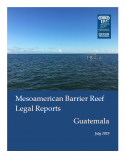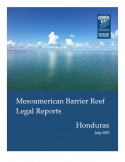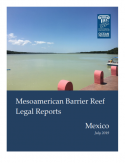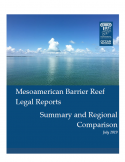
Research Reports
ELI publishes Research Reports available for free download that present the analysis and conclusions of the policy studies ELI undertakes to improve environmental law and policy. These reports contribute to education of the profession and disseminate diverse points of view and opinions to stimulate a robust and creative exchange of ideas. Those publications, which express opinions of the authors and not necessarily those of the Institute, its Board of Directors, or funding organizations, exemplify ELI’s commitment to dialogue with all sectors.
This document was prepared by the Environmental Law Institute in partnership with Rare. The report provides information regarding the structure and function of the Guatemalan government, and the institutional legal framework of the governance of small-scale fisheries and Marine Protected Areas (MPAs). Specifically, this report summarizes main actors and the legal framework for artisanal/small-scale fisheries, and for management of fisheries resources and marine protected areas.
Read More >
This document was prepared by the Environmental Law Institute in partnership with Rare. The report provides information regarding the structure and function of the Honduras government and the institutional and legal framework for the governance of small-scale fisheries and Marine Protected Areas (MPAs). Specifically, this report summarizes main actors and the legal framework for artisanal/small-scale fisheries and for management of fish resources in protected areas.
Read More >
This document was prepared by the Environmental Law Institute in partnership with Rare. The report provides information regarding the structure and function of the Mexican government, as well as the institutional legal framework for the governance of small-scale fisheries and Marine Protected Areas (MPAs). Specifically, this report summarizes main actors and the legal framework for artisanal/small-scale fisheries, and for management of fish resources in protected areas.
Read More >
This document was prepared by the Environmental Law Institute in partnership with Rare. The legal reports for Belize, Guatemala, Honduras, and Mexico – the four countries of the Mesoamerican Barrier Reef (MAR) – cover aspects of fisheries and marine management laws that set out the framework for protecting the sustainability of small-scale fisheries, marine ecosystems, and the livelihoods of the fisherfolk who depend upon them.
Read More >
The vast majority of assessed water bodies across the United States are designated as impaired. Cities contribute to the problem with stormwater runoff from roads, buildings, sidewalks, and other impervious surfaces polluting our rivers, lakes and streams. Indeed, many localities are on the hook to meet a gamut of regulatory requirements, from MS4 permits to TMDLs in order to reduce polluted runoff. Innovative localities are turning to green infrastructure practices to reduce flooding, control erosion, and prevent polluted runoff from entering streams and other waterbodies.
Read More >